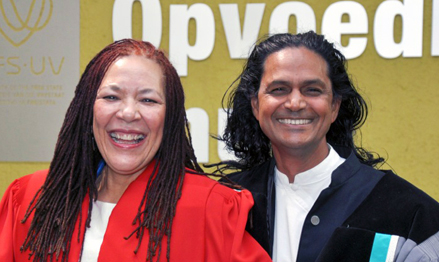Latest News Archive
Please select Category, Year, and then Month to display items
25 September 2024
|
Story Jacky Tshokwe
|
Photo Supplied
 Prof Louise Cilliers, University of the Free State (UFS) research fellow and former head of the Department of Classical Studies.
Prof Louise Cilliers, University of the Free State (UFS) research fellow and former head of the Department of Classical Studies.
Prof Louise Cilliers, one of our esteemed research fellows and former head of the Department of Classical Studies, has been awarded the prestigious 2024 UJ Translation Prize. Prof Cilliers received this accolade for her exceptional Afrikaans translation of the renowned Greek poet Konstantinos Kavafis' poetry collection, Van Alexandrië na Ithaka, published by Naledi.
Konstantinos Kavafis (1863-1933) is considered one of the most important literary figures in modern Greek poetry, known for his reflective and often philosophical poems that explore themes of history, identity, and human experience. In Van Alexandrië na Ithaka, Prof Cilliers brings the essence of Kavafis’ work to Afrikaans readers, carefully preserving the poet’s rich symbolism, historical depth, and emotional nuances.
Prof Cilliers has had a distinguished academic career, having served as head of the Department of Classical Studies. Her expertise in classical languages and literature, coupled with her passion for translation, made her an instrumental figure in making classical texts more accessible to a broader audience. This award is not only a testament to her scholarly achievements, but also to her dedication to the cultural and literary enrichment of the Afrikaans language.
The UJ Prize for Translation honours outstanding translations of literary works into any of South Africa’s official languages. Prof Cilliers' recognition continues the department's proud tradition of excellence in classical scholarship and language studies.
We extend our heartfelt congratulations to Prof Cilliers for this remarkable achievement and are excited to celebrate her continued contributions to the field of classical studies and translation.
About the UJ Translation Prize
The University of Johannesburg Translation Prize celebrates the best translations of literary works into any of South Africa’s official languages. It aims to promote high standards of literary translation and showcase the importance of bringing international literary voices into the local context through translation.
Rhodes professor calls for accountability in teacher education
2013-11-14
|
 |
Prof Jean Baxen of Rhodes University and Prof Dennis Francis, Dean of the Faculty of Education of the UFS.
Photo: Stephen Collett
15 November 2013 |
Lecture (pdf)
“Our education system needs quality teacher education.”
This was the message from Prof Jean Baxen, Deputy Dean of Research at Rhodes University in Grahamstown. She delivered the Education Public Lecture on ‘The lives of children, citizenship and teacher education: challenges and opportunities’ at the University of the Free State’s Bloemfontein Campus.
Growing up in White River, the rural areas of Eastern Transvaal (as it was previously known), Prof Baxen took the audience on a journey of the imagination. She shared stories of how she and fellow learners walked miles to get to school and how her son found himself in a situation of being unsure about his own racial identity, questioning what it meant to be ‘coloured’. She also related stories of how teachers are not sufficiently prepared to mediate information on HIV/Aids.
These stories revealed how little teachers cared, and also how difficult and challenging it is for learners to cope in such teaching and learning environments – thus calling for quality teacher education.
She stressed the fact that quality teacher education is needed in South Africa to assist in curbing the challenges children and fellow citizens come across in our broader society. “It is important that, as teacher educators, we should groom teachers to find and understand their identity, sexuality, and also the world they live in. There is an urgent need for us to hold ourselves and others accountable and to not distance ourselves and make it someone else’s responsibility – it is our joint responsibility as citizens,” she said.
We need a pedagogy that would navigate and start formulating a language that we could use to face these challenges, she proposed.